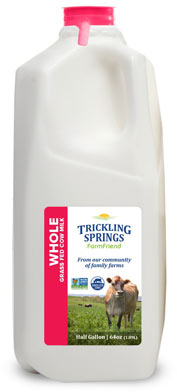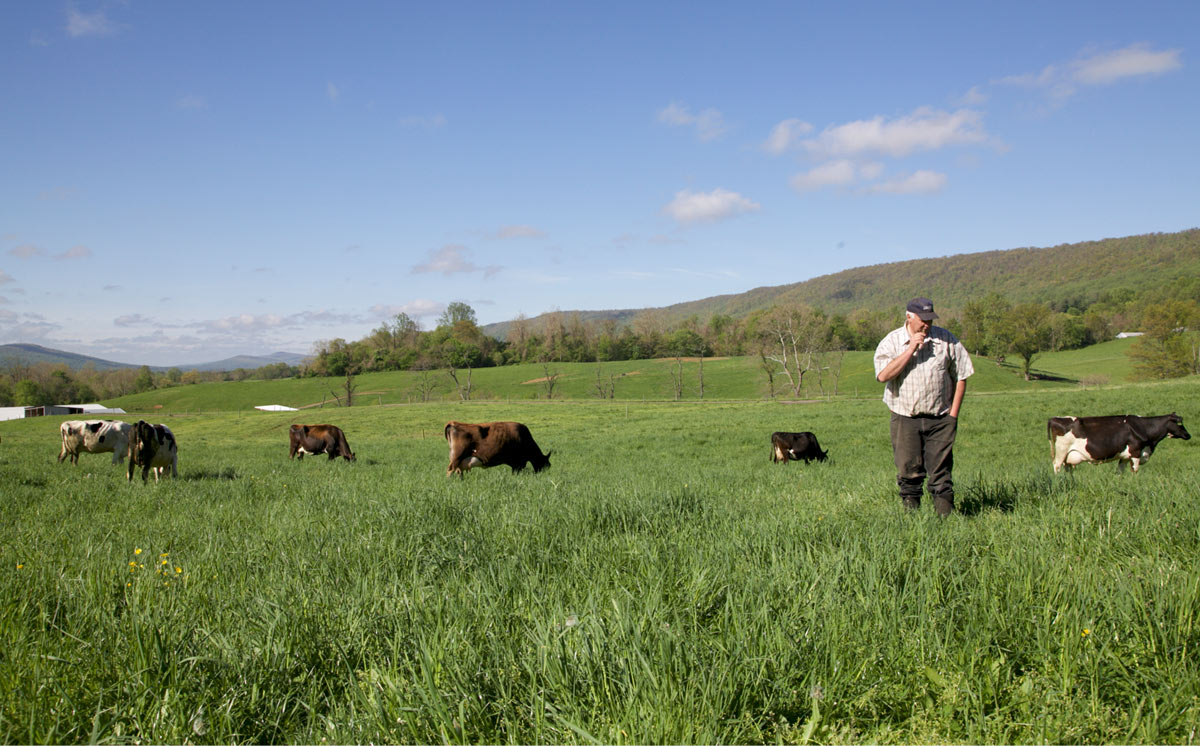At Trickling Springs Creamery switching to non-GMO milk production has been a long-time company goal, according to Joe Miller, director of marketing and specialty sales.
“We thought it was the right thing to do,” he says. “From the beginning, we set requirements for not allowing rBST (genetically engineered bovine growth hormone). Being non-GMO makes a difference in the quality of dairy products and the well-being of cows.”

Trickling Springs Creamery’s Non-GMO Project Verified FarmFriend milk. Photo courtesy of Trickling Springs Creamery.
Based in Chambersburg, Pennsylvania, Trickling Springs buys milk from 44 dairy farms in Pennsylvania, Maryland, and Virginia. The farms have an average of 60 cows, which are mostly grass-fed. About 60 percent of Trickling Springs’ production is organic; the other 40 percent is “natural,” non-GMO, sold under the FarmFriend brand. Products include fresh and chocolate milk, cream, butter, raw cheese, ice cream, and goat milk. These are sold in supermarkets and natural food stores and cooperatives from Connecticut to Florida and as far west as Ohio.
According to Miller, Trickling Springs became concerned about GMO contamination of crops used for feed such as corn, soybeans, and alfalfa hay and decided to pursue Non-GMO Project verification. They began the verification process in August 2014 and started GMO testing of feed crops grown on both organic and conventional dairy farms.
The Non-GMO Project standard requires the use of tested non-GMO feed, and cows must consume non-GMO feed for at least 30 days for milk to be verified. (The latter rule was one year when Trickling Springs went through the verification process.) The feed must meet a GMO threshold of less than 5 percent.
Trickling Springs’ organic products received Non-GMO Project verification by October 2014. Non-GMO verification of the main FarmFriend farm was completed in October 2015, and the rest of the farms were verified by March 2016. Today, all Trickling Springs Creamery Products, organic and conventional, are Non-GMO Project Verified.
Demand for his company’s products are strong, particularly the FarmFriend products, which cost about 30 percent less than the company’s organic products.
“We’ve seen higher growth in sales of FarmFriend products but our organic sales growth is hurt by an oversupply of organic milk in the market,” Miller says.
Non-GMO Project verification offers dairy companies a way to differentiate their products in a challenging over-supplied market for milk.
“You have to differentiate yourself,” says Warren Taylor, owner of Ohio-based Snowville Creamery, which also sells non-GMO milk. “Non-GMO provides a third option between organic and conventional. It’s the next obvious attribute after rBST-free.”
Pathway to organic dairy production
According to Miller, another advantage to Trickling Springs Creamery’s non-GMO verification program is that it provides a pathway for dairy farms to become certified organic. FarmFriend standards, which include raising cows on pasture, meeting standards for cow health, and prohibiting the use of synthetic hormones, are similar to those for Trickling Springs’ organic farms.
“Because we have strict standards for our FarmFriend farms, it’s not difficult for farmers to become certified organic,” he says. “If we can move them toward Non-GMO Project verification, we are also helping move them one step forward toward organic.”
About 80 percent of FarmFriend farms have transitioned to organic. “We’ve transitioned farmers (to organic) who originally said they would never be certified,” Miller says.
Non-GMO verification is also important for Trickling Springs’ organic products. “This was a step toward raising awareness about GMOs, and it’s about ensuring the integrity of organic crops and food,” Miller says.
According to Annie Shannahan, Non-GMO Project director of client services, there are 387 Non-GMO Project Verified dairy products now on the market, and growing interest from dairy producers seeking non-GMO verification,.
“In general there has been an increase in demand for dairy, meat, milk and eggs since the changes to the animal feed threshold in the Non-GMO Project Standard in 2016,” Shannahan says.
Some other non-organic dairy producers that sell Non-GMO Project Verified products include Hartzler Family Dairy in Ohio, Trace Cooperative in Minnesota, Byre Dairy in New York, and MyShan Dairy in Washington, to name a few. Many organic dairy producers such as Organic Valley and Stonyfield Farm also have Non-GMO Project Verified products.
Clover Stornetta responds to consumer demand
One of the largest dairy producers in the U.S. to become Non-GMO Project Verified is Clover Stornetta based in Petaluma, California. Clover is transitioning its dairy products to non-GMO based on consumer demand.
“It stems back to us having a mission to listen to consumers, and there is a desire among our consumers to avoid GMOs,” says Kristel Corson, Clover’s marketing director.
In an online survey, 56 percent of Clover consumers said they thought GMOs presented health risks, and 60 percent said they wanted a non-GMO milk option.
“Milk is a natural product, and consumers thought that having a product not connected with GMOs is important,” Corson said.
Last fall, Clover announced that it would transition all of its conventional dairy milk products to be Non-GMO Project Verified by 2018.
Clover sources milk from 19 organic and 13 conventional dairies that have an average of 350 cows per farm. The company processes more than 50,000 gallons of milk per day. Production is evenly split between organic and conventional.
Besides meeting consumer demand, Clover wanted to help their dairy farms in a challenging milk industry.
“We wanted to help them become more sustainable and are always looking for opportunities for our dairy farmers to gain value,” says Mkulima Britt, director of strategic partnerships.
Similar to Trickling Springs Creamery, Clover emphasizes sustainability in its conventional milk production. The company established its own set of quality standards for its milk with the North Coast Excellence Certified program; was the first dairy in the U.S. to become American Humane Certified; and its milk is also rBST-free. Non-GMO Project verification seemed like the natural next step.
The verification process was not difficult for Clover because, like Trickling Springs, their organic products had already been non-GMO verified.
“We process both conventional and organic and have experience with segregation to produce those products,” Britt says. “Non-GMO verification is something we know we can do.”
Clover started the verification process with 25 percent of its conventional dairies. The company will introduce its first Non-GMO Project Verified conventional milk products this month.
“Parents are asking for this”
Clover’s dairy farms buy feed from brokers or feed mills. According to Britt, there are sufficient supplies of non-GMO feed to meet Clover’s needs. “There are supplies available. It’s more a fine-tuning of the supply chain to make sure it is more efficient.”
Shannahan also says there is a good supply of non-GMO feed. “We hear from our partners working closely with those in the dairy supply chain that there is a sufficient supply of non-GMO feed.”
Clover’s non-GMO verified milk provides an affordable alternative to organic similar to Trickling Springs’ FarmFriend milk.
“There is a large set of consumers who can’t afford organic, but still want humanely and sustainably produced milk,” Corson says.
The reaction from Clover’s customers to Non-GMO Project Verified milk has been “extremely positive,” Corson says. “Parents are asking for this, and our part is to respond to that demand.”









